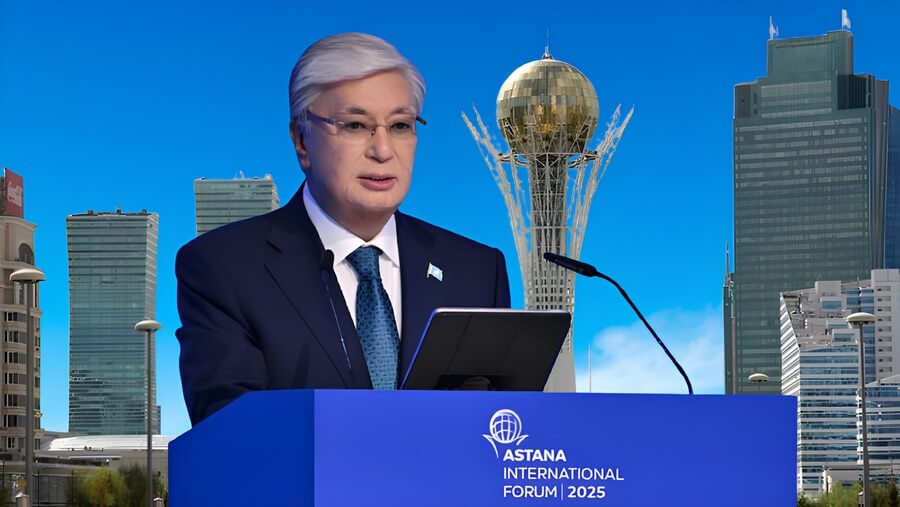Kazakhstan, viewing itself as a middle power, appears to be seeking to unite other middle and small nations in an effort to reform the United Nations, particularly its Security Council. However, the major world powers – namely the permanent members of the Security Council –are unlikely to willingly relinquish their dominance in an international organization that was established in the aftermath of the Second World War.

From Kazakhstan’s perspective, vital decisions cannot be made by a handful of nations alone. That is why Astana is urging for structural reform of the UN system.
“Its structural reform is essential to ensure that the UN remains relevant and truly reflects the world as it is, not as it was,” Kazakhstan’s President Kassym-Jomart Tokayev said on May 29 at the plenary session of the Astana International Forum (AIF).
His proposal received strong support from North Macedonia’s President, Gordana Siljanovska-Davkova, who was among the prominent guests at the event. The gathering brought together political and business leaders from around the world under an expanded agenda that included climate change, energy security, and sustainability.
“The Security Council should be expanded, reformed and democratized to make it more accountable and more responsible in maintaining international peace and security,” Davkova stressed, pointing out that small countries, along with middle powers, should be the “the greatest advocates of effective multilateralism.”
While waiting for a multilateral world order – which could take years, if not decades, to establish – small countries and middle powers are expected to continue strengthening bilateral relations. It is unlikely a pure coincidence that Rwanda’s President Paul Kagame was another major guest at this year’s Astana International Forum.
Kazakhstan – the world’s largest uranium producer – is interested in importing beryllium, a critical mineral used in telecommunications, semiconductors, aerospace, and defense industries, from Rwanda to meet the needs of its uranium giant, Kazatomprom. This move comes as Astana prepares to build its first nuclear power plant. The problem, however, is that Central Asia’s largest economy lacks the technology necessary to build nuclear facilities, which is why it will have to rely on the assistance of foreign corporations.
So far, Russia’s Rosatom, South Korea’s Korea Electric Power Corporation, France’s Électricité de France (EDF), and the China National Nuclear Corporation have expressed interest in building a 1.2 GW nuclear power plant unit in Kazakhstan’s Zhambyl District, located in the Almaty Region. Tokayev has repeatedly stressed that the facility should be built not by a single actor, but by a consortium of several companies.

However, as Kazakhstan’s Deputy Foreign Minister Roman Vassilenko told World Geostrategic Insights, no decision has yet been made regarding the composition of the consortium, although Astana is actively negotiating with the companies interested in the construction.
“We will need more than one nuclear power plant, which means that there will likely be different types of consortiums building different types of nuclear facilities,” Vassilenko stressed.
In the meantime, Astana is expected to continue developing closer relations with other middle powers and small countries, aiming not only to potentially reform the United Nations, but also to strengthen its own position in the global arena. One such nation is Afghanistan, whose representatives also participated in the Astana International Forum. The Taliban-led officials came to the Kazakh capital to seek investment and assistance not only from Kazakhstan but also from other countries, to support the reconstruction of the war-torn nation.
“We ask Kazakhstan, as well as other Central Asian states, to try to see the situation in Afghanistan from our perspective, not through the prism of Western propaganda,” said the Taliban’s acting Minister of Commerce and Trade, Haji Nooruddin Azizi, during one of the AIF sessions, emphasizing that Afghanistan can prosper if Astana and other regional actors provide economic assistance.
Following its 2024 decision to remove the Afghan group from its list of terrorist organizations, Kazakhstan began actively developing relations with Kabul. The authorities in Astana now seek to increase the bilateral trade volume between the two countries to $3 billion in the coming years. The Taliban, on the other hand, are seeking Kazakhstan’s assistance in the construction of road and railway networks in Afghanistan—most notably the Trans-Afghan Railway Corridor, which would connect Pakistan, Afghanistan, and Uzbekistan. Astana could use this network to increase its exports to Pakistan and, beyond that, to South Asia.
Although, at least for the time being, Astana remains focused on close trade and economic cooperation with Afghanistan – which still has room for expansion – in the long term, it might also expect Kabul to join a group of middle powers and small countries pushing for structural reforms of the United Nations. However, it remains to be seen how major global powers will react to such initiatives.
One thing is clear: if successful, Kazakhstan’s efforts could position it as a key diplomatic and economic bridge between Central Asia, South Asia, and the broader Global South.
Author: Nikola Mikovic – Journalist, researcher and analyst based in Serbia.
(The views expressed in this article belong only to the author and do not necessarily reflect the editorial policy or views of World Geostrategic Insights).







